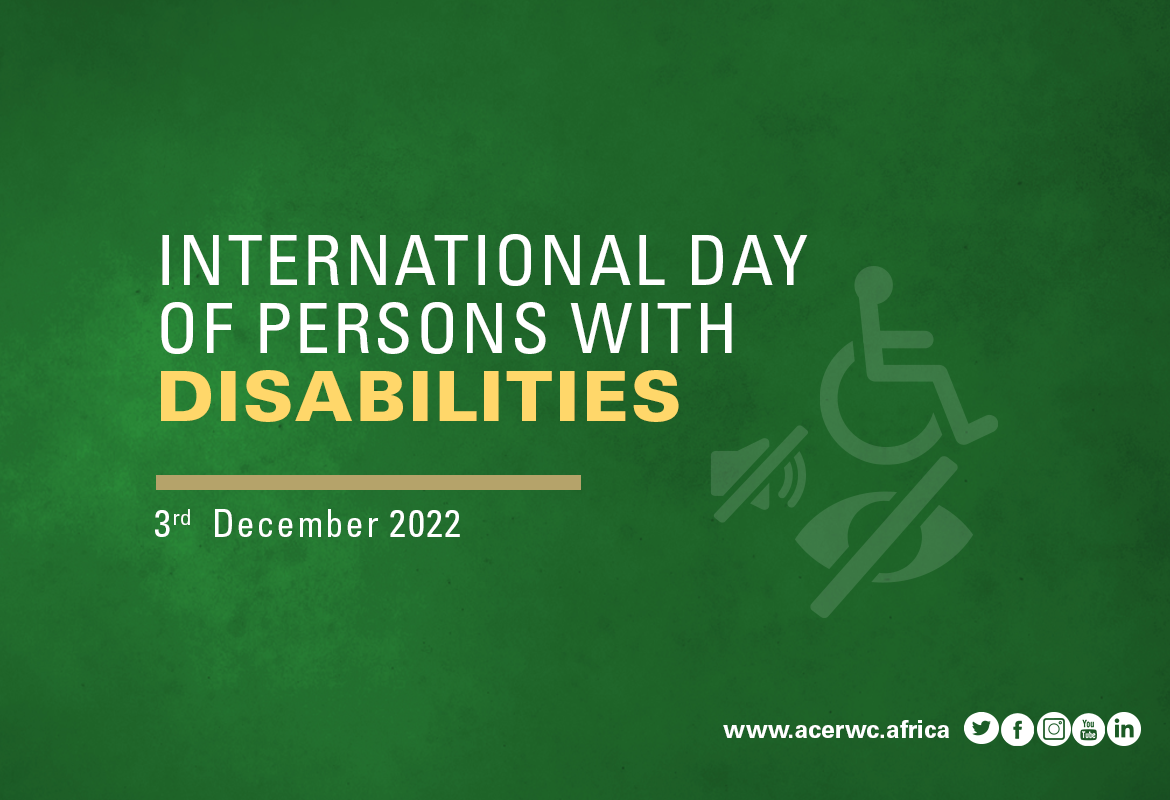The Working Group on Children with Disabilities in Africa of the African Committee of Experts on the Rights and Welfare of the Child (ACERWC) joins the world on this 3rd day of December 2022 to commemorate the International Day of Persons with Disabilities which is celebrated under the theme ‘Transformative solutions for inclusive development: the role of innovation in fuelling an accessible and equitable world’.
Recalling article 13 of the African Charter on the Rights and Welfare of Child ; article 18 of the Protocol to the African Charter on Human and Peoples’ Rights on the Rights of Persons with Disabilities in Africa ; Africa’s Agenda for Children: Fostering an Africa Fit for Children (Agenda 2040) that takes cognisance of the elucidation in Agenda 2063 (paragraph 53) that ‘African children shall be empowered through the full implementation of the African Charter on the Rights of the Child’ ; further recalling that the AU Panel on Emerging Technologies (APET) recommends the African countries to consider investing more in assistive and digital emerging technologies to address challenges of children with disabilities ; the ACERWC Working Group on children with disabilities appreciates that the AU Member States have made significant steps towards the recognition of the rights of children with disabilities through the enactment of innovative legislative measures clarifying the duties of local government authorities and the adoption of specific policies to protect the rights of children with disabilities. Despite the progress that has been made in many African countries, it is noted that most African States have not effectively implemented the relevant instruments they have ratified and enacted on the rights of children with disabilities. Thus, children with disabilities continue to face multiple and interlinked challenges that hinder them from fully enjoying their rights.
The ACERWC’s Working Group on children with disabilities notes that Africa has experienced significant growth in the development and utilisation of technologies in recent years. However, there have been considerable gaps for children with disabilities in accessing such innovative solutions. During the COVID-19 pandemic, various information and services were provided through online platforms, and as a consequence, online schooling was not accessible to all children with disabilities,which has disproportionately affected their rights and welfare. Children with disabilities are significantly affected by emerging forms of inequalities and discrimination and they continue to face online and offline barriers on a daily basis which hinder them from fully accessing public services and enjoying their rights as enshrined in the African Children’s Charter and other international and regional human rights instruments. It is noted that children with disabilities continue to face barriers in accessing the internet and assistive technology (AT) which is exacerbating their vulnerabilities to living in poverty and experiencing higher rates of violence, neglect and abuse within and outside their households. This online and offline discrimination proves that despite the progress African governments have made over the past years, there is still a long way to go.
In addition to the COVID-19 pandemic, children with disabilities continue to be disproportionately affected by other emergency situations such as war, conflicts and climatic shocks, among others which are deepened the existing inequalities and increased their vulnerability to suffering from the severe impact of emergencies and pandemics. Children with disabilities in more vulnerable situations such as girls, refugees, internally displaced, migrants and children affected by armed conflicts and natural disasters among others are particularly vulnerable to stigma and discrimination in all facets of life. Moreover, it has been observed that a lack of digital and AT and adequate habilitation and rehabilitation services, among others, negatively affect the effective enjoyment of the rights and welfare of children with disabilities in Africa.
Considering the challenges of children with disabilities and the theme of the commemoration on this day, the ACERWC through its Working Group on children with disabilities in Africa urges the AU Member States and other relevant stakeholders to :
- Renew their commitment to ensure the effective realisation of the rights of children with disabilities and take all appropriate measures to identify, remove, and prevent online and offline barriers that exist ;
- Utilize the opportunities available for children with disabilities in the technology and the digital world to build a more inclusive, accessible and equitable Africa for every child with disabilities ;
- Take all appropriate measures to promote digital inclusion for children with disabilities so that they can take a more prominent role in designing transformative solutions and emerging technological solutions for inclusive development ; and,
- Observe the International Day of Persons with Disabilities with appropriate ceremonies, activities, and programs.







